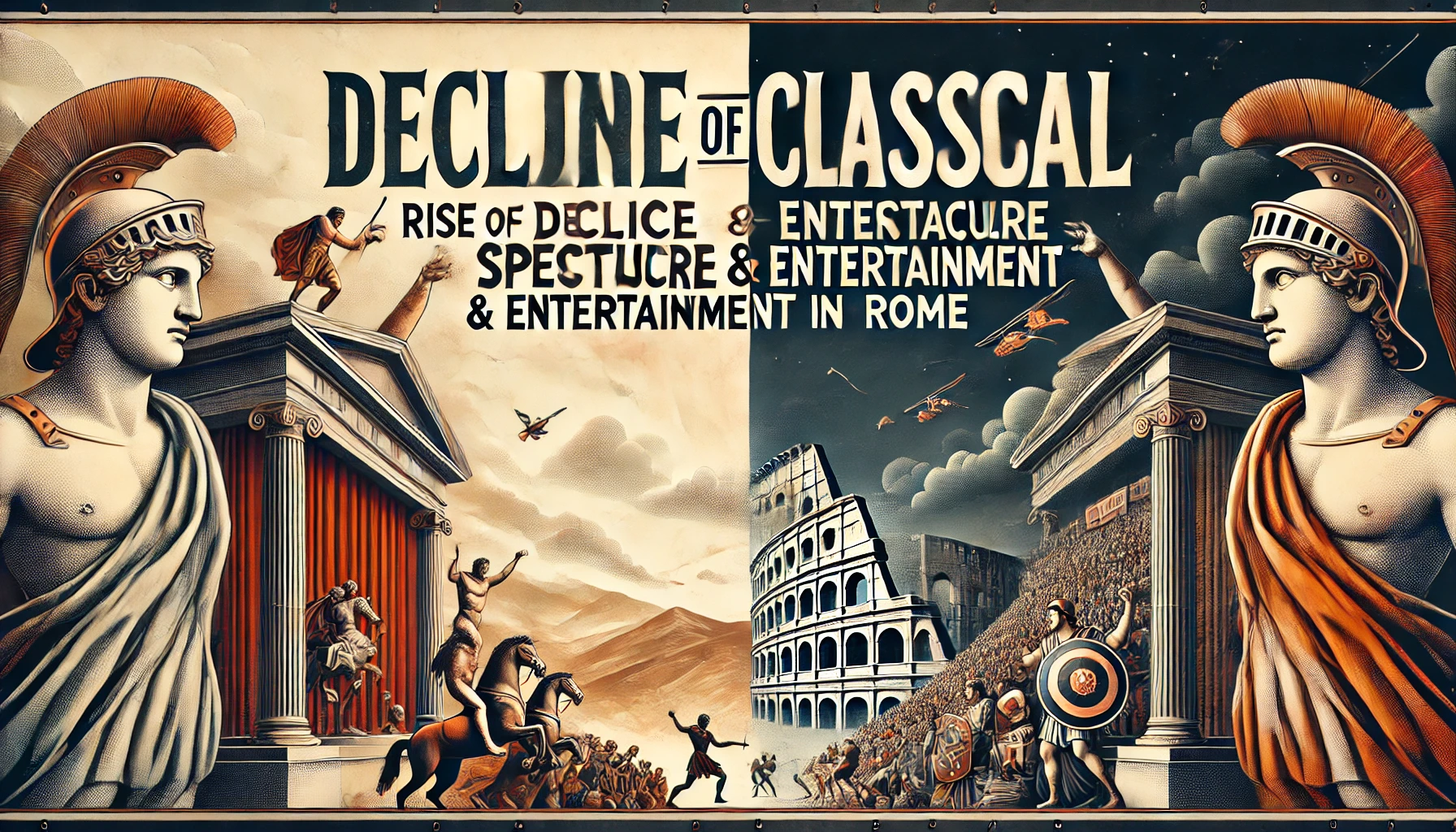

Decline of Classical Drama (Rise of Spectacle & Entertainment in Rome)
Classical drama, particularly in Greece and Rome, played a crucial role in shaping early theatre. However, over time, Roman drama declined due to the increasing demand for grand spectacles and mass entertainment. The shift from intellectual and philosophical drama to violent and extravagant performances marked the end and decline of classical drama in Roman society.
During the early Roman period, plays inspired by Greek tragedy and comedy were popular. However, as Rome expanded its empire and gained wealth, public tastes changed. The Roman audience gradually lost interest in serious drama and preferred spectacles that were visually impressive and emotionally thrilling.
Roman rulers used entertainment as a tool for political control. To maintain public support and prevent civil unrest, emperors organized lavish games and spectacles under the policy of “bread and circuses”—providing free food and grand entertainment to keep the people satisfied.
As traditional drama declined, the following forms of entertainment replaced it:
| Entertainment Type | Description |
| Gladiatorial Contests | Armed combat between trained fighters, often ending in death. |
| Chariot Races | High-speed races in massive arenas like the Circus Maximus. |
| Animal Hunts (Venationes) | Wild animals fought each other or were hunted by warriors. |
| Mock Naval Battles (Naumachiae) | Artificial lakes were created to stage sea battles. |
| Pantomime & Farce | Non-verbal storytelling with music and exaggerated gestures. |
These performances were larger, bloodier, and more visually spectacular than traditional drama, making them the preferred form of entertainment for the masses.
As public interest in intellectual drama faded, playwrights struggled to find an audience. While some playwrights adapted to the new style of pantomime and farce, others abandoned the art altogether. The great traditions of Aeschylus, Sophocles, Euripides, Plautus, and Terence were no longer central to Roman cultural life.
Despite its decline, classical drama did not disappear completely. It influenced later theatrical traditions, particularly in the Renaissance, when playwrights like Shakespeare revived elements of Greek and Roman drama. However, in Rome, drama was largely replaced by grand spectacles, marking a significant cultural shift from intellectual performance to physical spectacle.
The decline of classical drama in Rome was driven by a shift in public taste, political strategies, and the rise of large-scale spectacles. As emperors promoted violent and grand entertainment, traditional theatre lost its significance. However, the themes and structures of Greek and Roman drama continued to influence later theatrical traditions, leaving a lasting impact on the development of Western theatre.
#decline of classical drama #decline of classical drama #decline of classical drama #decline of classical drama #decline of classical drama #decline of classical drama #decline of classical drama
Read More
Impact of Classical Drama on Renaissance Theatre
Comparison of Greek and Roman Drama (Themes, Structure, Influence)
Plot Construction in Pride and Prejudice
Introduction to Fiction and Non Fiction
Of Death — Francis Bacon (Text)
Of Truth Critical Analysis by Sir Francis Bacon
Of Truth by Francis Bacon Summary
Visit Us on our Facebook Page:
Classical Influences in Faustus This text focuses on Classical Influences in Faustus by Christopher Marlowe.…
Social Taboos in The God of Small Things Below is the account of how Arundhati…
Introduction to Much Ado About Nothing This article is gives a brief but insightful Introduction…
Narrative Technique in The God of Small Things Arundhati Roy’s The God of Small Things…
Comprehensive Summary of The God of Small Things Arundhati Roy’s The God of Small Things…
The Climax and Tragic Ending in Hamlet This article explores the topic The Climax and…
This website uses cookies.